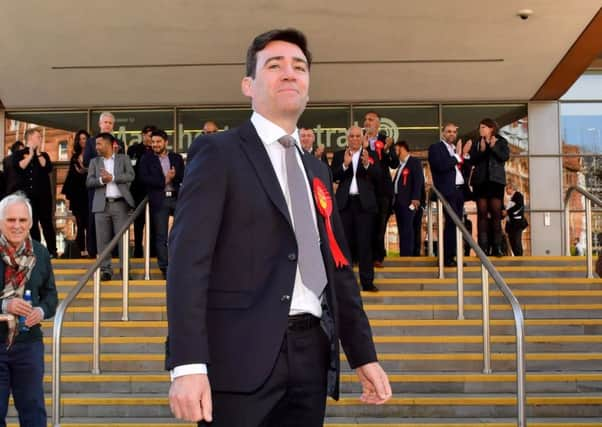Crushing loss for Labour points to big Tory majority in Commons


The Tories added 562 councillors and seized control of 11 councils, taking advantage of the Ukip collapse and capturing the former Labour heartland of Derbyshire in the party’s best result for a quarter of a century.
Conservatives also achieved shock victories in elections for regional mayors in the West Midlands and Teesside, as well as in the West of England.
Advertisement
Hide AdAdvertisement
Hide AdLabour won the mayoral races in Liverpool and Manchester, where the former minister Andy Burnham triumphed.
Allies of Jeremy Corbyn tried to deflect blame for the result from the party leadership.
Shadow chancellor John McDonnell insisted the election “hasn’t been the wipeout that people expected” after keeping hold of councils in south Wales.
Shadow home secretary Diane Abbott said the vote was “not a presidential election”.
But the party lost 382 councillors and gave up control of seven authorities across England and Wales, with analysis suggesting that Mrs May can expect a Commons majority of at least 48 on 8 June.
Liberal Democrats described early results as “patchy”, with the party losing 41 seats and failing to make progress in their targets of Cardiff, Somerset and Gloucestershire.
The party’s vote was squeezed in Brexit-supporting parts of the country, limiting gains. But its overall vote share of 18 per cent was their best result in any election since entering a coalition with the Tories in 2010, and put them nine points behind Labour on 27 per cent.
Lib Dem leader Tim Farron said Labour’s meltdown set his party up to make scores of gains in the general election.
Advertisement
Hide AdAdvertisement
Hide AdHe said: “These results tell a clear and stark message. Labour has collapsed. They cannot win the general election. The voters have delivered their verdict on Jeremy Corbyn.”
Ukip suffered a near- wipeout, gaining just one councillor and losing in nearly all the wards it was defending. The party shed 138 councillors and no longer has a presence in Lincolnshire, Essex and Hampshire.
Party leader Paul Nuttall claimed they were “victims of our own success” in driving the agenda on Brexit.
He said: “Our electoral success over recent years was a key driver in forcing the Conservatives to embrace our cause under a new Prime Minister who was campaigning for a Remain vote in the referendum a year ago.
“If the price of Britain leaving the EU is a Tory advance after taking up this patriotic cause, then it is a price Ukip is prepared to pay.”
Arron Banks, the donor who bankrolled Ukip’s growth in recent years, said the party was “finished as an electoral force” and its leadership needed “a strategic bullet to the back of the head”.
The SNP claimed that the Conservative gains showed the party “dancing to the Ukip tune” and were taking a hard line on Brexit.
The SNP candidate in Ochil and South Perthshire, Tasmina Ahmed-Sheikh, said: “The reality of results in England is that it shows Ukip have won control of this increasingly hard-right Tory government.
Advertisement
Hide AdAdvertisement
Hide Ad“Theresa May has put the interests of her party before those of the country – dancing to the Ukip tune and cynically pushing the Ukip agenda.”
The only parties other than the Tories to gain ground in England and Wales were the Greens, who added six councillors for a total of 40, and Plaid Cymru, who picked up 33 wards and are four councillors short of their best result.